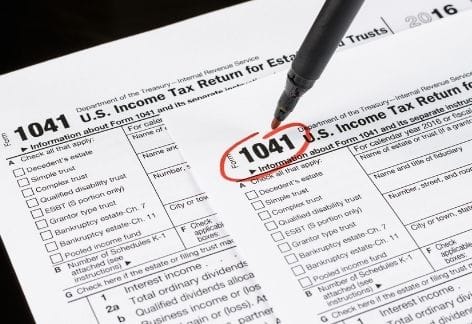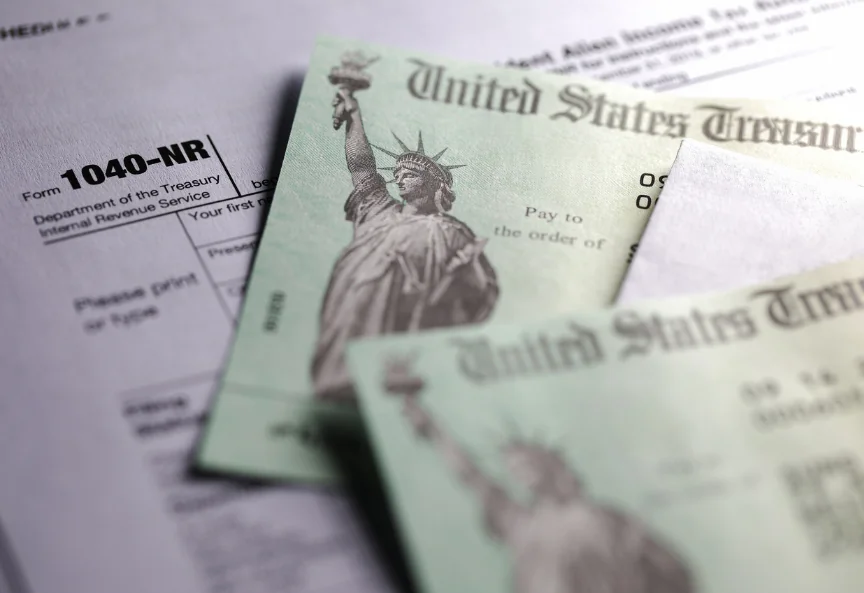If you have found a mistake on tax returns already filed, do not panic. There are ways to fix these tax return mistakes.
[lwptoc numeration="none" skipHeadingLevel="h3" skipHeadingText="Contact Rush Tax Resolution Today"]
Whenever tax season begins, people rush to get their taxes done – one, so they’re out of the way, and second, to claim any refunds they may be eligible for. But if you happen to make a mistake on tax returns already filed, knowing what to look out for and how to prepare yourself for the potential consequences is important. Here is what you should know:
Do Not Panic
If you suspect that you have made a mistake on your tax returns, the last thing you should do is panic. Take a long, deep breath, and relax. In the vast majority of cases, minor mistakes and issues iron themselves out with incredibly few to no consequences.
If a mistake nets you a slight increase in your tax balance, the IRS will usually pull it out of any eligible refunds or credits first. The IRS will also inform you of any errors and suggested changes, and in many cases, will even go ahead and make those changes automatically (while giving you the chance to appeal them, and provide evidence to support your claim).
In any case, the smartest thing to do is wait. Let the IRS process your tax return and come back to you with the information you need to decide whether you need to amend your return or not. To that end, the IRS can help you make an important decision.
Amending Taxes: Use the IRS’s Amended Return Tool
The IRS provides taxpayers with an online interactive test needed to determine whether their return would have to be amended, and how. The IRS corrects many errors and mistakes themselves but may require taxpayers to amend their tax returns under specific circumstances. These include wishing to change one’s filing status (such as changing from a single or separate filing status to a joint filing status), even when no errors were made in the return itself.
When amending a tax return, you will need to gather some key information first.
-
- 1. First, you will need the original return. The tax tool linked above is only relevant to Form 1040 and its variations. Do not mistake the tool for any sort of official tax advice.
- 2. If you are still unsure about whether to amend your return, definitely contact a professional tax attorney and go over your situation with them, step-by-step.
Identifying Mistakes on Tax Returns
Another way to determine whether your return will need to be amended or addressed is knowing what the IRS typically flags as a mistake on tax returns. Tax returns can contain any number of potential errors, but the most common usually involve a missing signature or simple math error. Some common taxpayer mistakes when filling out and filing a return include:
-
- Incorrect SSN. Your Social Security Number on every tax return sent to the IRS should match the number provided on your Social Security card.
- Misspelled names. Even simple misspellings can cause errors in the system, as the name must match the number exactly.
- Wrong filing status. Married couples filing jointly shouldn’t report as filing separately, and vice versa. There are other filing statuses to be aware of as well, such as head of the household.
- Math that doesn’t add up. This is one of the most common mistakes, and usually the least severe. When the numbers don’t add up and the error isn’t egregious, the IRS will typically correct your return for you. It’s a bigger deal when it seems like the numbers were intentionally altered (even when they really weren’t).
- Claiming credits or deductions you aren’t entitled to. If a taxpayer takes into consideration a credit or refund they aren’t actually supposed to receive, this may result in an unexpected tax debt. A professional tax preparer can help you work through what credits and deductions you can safely claim.
- Forgetting to sign your return. All tax returns sent to the IRS must be signed, although there are certain exceptions.
- Forgetting to renew an ITIN. Individual tax identification numbers can expire. If yours has expired, you should have received a notice from the IRS telling you so. This means you should renew your ITIN.
For other potential errors or a mistake on tax returns filed, bring a copy of your return to a tax professional and discuss your situation in greater depth.
How to Fix Tax Return Mistakes
If you've noticed a mistake on your tax return, there are a number of ways to correct the information and avoid penalties with the IRS. These three options can help you amend your returns.
1. The IRS May Fix the Issue for You
In some cases, the IRS will not require an amended return because the issue will have already been addressed and fixed. This is most often the case when the only error you made was a simple math mistake.
If you were eligible for a refund, they may claim a portion of it to pay the outstanding balance. If you have instead become eligible for an additional refund, they may even give you back more tax dollars.
However, if you now owe the IRS, you will be given a window of time to send payment (or, in the case of a larger and more substantial debt, you will be given time to arrange a payment plan). Ignoring the IRS’s payment deadlines can result in penalties and ensuing collection actions.
2. Filing an Amended Tax Return
Amended tax returns can be best summarized by their three columns:
-
- Column A includes the details of the original return.
- Column B includes what adjustments are necessary, such as including or removing deductions, refunds, filing status, adjusted gross income, and so on.
- Column C reports the correct amounts that should have been written in the first tax return.
Sadly, there is no e-filing option for amended returns. When you have finished filling out your Form 1040X, you must print it out. You will need a copy of the previously filed tax return (the one being amended), as well.
3. Hire a Reputable Tax Preparer
Tax preparation services, when offered by a reputable tax preparer with the necessary credentials (an IRS Preparer Tax Identification Number and history as a tax professional) can help taxpayers avoid simple clerical errors and major tax liabilities alike, so long as they keep track of their finances and communicate often with their tax expert.
Working with a reputable tax preparer can save you the headaches and worries associated with tax mistakes, the amendment process, and a potential tax debt (not to mention the IRS’s ensuing penalties and collection process).
How Rush Can Help You
Rush Tax Resolution will work with you to identify and amend tax return errors, help you catch and avoid return issues in the future, and prepare your taxes to not only mitigate the risk of a red flag or audit, but help ensure that you don’t miss out on any credits, deductions, or refunds that you might be eligible for.
By choosing us as your go-to tax professionals for tax debt resolution, return preparation, and tax advice, you are partnering with one of the most trusted and experienced tax teams in the country.
CONTACT RUSH TAX RESOLUTION TODAY











